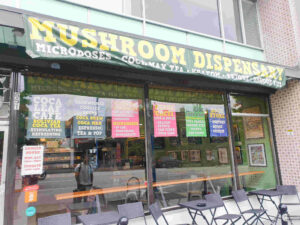Notable Elements
Historical and Current Legal Status: Magic mushrooms have a long history of use in spiritual and cultural practices but are classified as Schedule I substances in the U.S., with varying legal statuses worldwide.
Decriminalization and Legalization Movements: There’s a growing trend towards decriminalizing and legalizing magic mushrooms, especially in the U.S., driven by emerging research on their therapeutic benefits.
Therapeutic Research and Potential: Studies indicate potential benefits of psilocybin, the active compound in magic mushrooms, in treating mental health disorders, sparking reconsideration of legal restrictions.
Legal Challenges and Regulatory Questions: The legal landscape varies globally, with challenges in establishing standardized regulations for therapeutic use and addressing inconsistencies between state and federal laws.
International Legal Perspectives: The legal status of magic mushrooms differs significantly around the world, reflecting diverse cultural and legal attitudes towards these substances.
Public Perception and Education Efforts: Shifting public perception from negative associations to an understanding of therapeutic potential is crucial, requiring focused education and awareness campaigns.
Regulatory Frameworks for Safety: Developing robust regulatory frameworks is essential for ensuring safe and controlled therapeutic use of psilocybin mushrooms.
Healthcare Providers’ Role: Medical professionals must stay informed about legal changes and research to guide patients appropriately regarding psilocybin therapy.
Ethical and Social Considerations: Legalization efforts must address ethical concerns like equitable access to therapy and respect for the cultural significance of psilocybin mushrooms.
Advocacy and Ongoing Research: Advocacy groups and continuous research are key in shaping future legal landscapes, emphasizing the need for laws based on scientific evidence.
Balanced and Informed Approach: The future of psilocybin in mainstream culture and medicine requires a balanced approach, considering benefits, risks, and societal implications.
Conclusion: The legal status of magic mushrooms is evolving, reflecting a broader shift in drug policy and mental health treatment, dependent on ongoing research and societal discussions.
Introduction
The legal status of magic mushrooms, or psilocybin mushrooms, has been a subject of considerable debate and fluctuation across the globe. These naturally occurring psychedelics have been used for centuries in various cultural and spiritual practices. However, their legal standing in modern times, particularly in the context of rising interest in their therapeutic potential, presents a complex and evolving landscape. This blog post aims to navigate the intricate legal terrain surrounding magic mushrooms, discussing their classification, legal shifts, therapeutic implications, and what the future might hold for these ancient fungi.
Historical Perspective and Current Classification
Magic mushrooms have been part of human history for millennia, with evidence of their use in ancient civilizations for religious and spiritual purposes. Despite this rich history, their modern legal story begins in the mid-20th century. The U.S. Controlled Substances Act of 1970 marked a significant turning point, classifying psilocybin (the active compound in magic mushrooms) as a Schedule I substance. This classification implies that it has a high potential for abuse, no currently accepted medical use in treatment, and a lack of accepted safety for use under medical supervision.

This classification is mirrored in many countries worldwide, though the specifics vary. For instance, in the United Kingdom, magic mushrooms fall under Class A drugs, while in some parts of Europe, their legal status is more ambiguous.
The Rise of Decriminalization and Legalization Efforts
Despite their stringent classification, recent years have seen a shift in perception regarding magic mushrooms, primarily driven by emerging research on their potential therapeutic benefits. This shift has led to growing decriminalization and legalization movements, especially in the United States.
Cities like Denver, Colorado, and Oakland, California, have decriminalized the possession and use of magic mushrooms. In 2020, Oregon made history by becoming the first U.S. state to legalize psilocybin mushrooms for therapeutic use, under a regulated program that is currently under development.
Therapeutic Potential and Medical Research
The driving force behind the changing legal status of magic mushrooms is the burgeoning field of research into their therapeutic potential. Studies have indicated that psilocybin may be beneficial in treating various mental health disorders, including depression, anxiety, and PTSD. It has shown promise in end-of-life care, helping terminally ill patients cope with existential distress.
These studies are prompting medical and legal communities to reconsider the strict prohibitions surrounding psilocybin mushrooms, weighing their potential benefits against historical stigmas and concerns about misuse.
Legal Considerations and Challenges
Navigating the legal landscape of magic mushrooms presents several challenges. Laws vary significantly not just between countries, but also within countries, especially in federations like the United States. For instance, while some states or cities may decriminalize or legalize psilocybin, it remains illegal under federal law, creating a complex patchwork of regulations.
Another challenge is establishing a regulated framework for therapeutic use. Questions about dosage, administration, and the training of facilitators or therapists need to be addressed. Oregon’s Psilocybin Services Act is pioneering in this regard, attempting to create a regulated program for the administration of psilocybin in therapeutic settings.
International Perspectives
Globally, the legal status of magic mushrooms varies widely. In the Netherlands, for example, “truffles” containing psilocybin are legal and sold in “smart shops,” while the mushrooms themselves are banned. In Brazil and Jamaica, psilocybin mushrooms are legal and not classified as a narcotic.
This international patchwork reflects differing cultural attitudes, historical usage, and legal philosophies regarding natural psychoactive substances. It underscores the importance of understanding local laws for travelers and enthusiasts.
Future Directions and Considerations
Looking forward, the legal landscape for magic mushrooms is likely to continue evolving. As research expands and public opinion shifts, more regions may consider decriminalization or legalization, especially for therapeutic uses. However, this journey is likely to be gradual, marked by careful consideration of the implications for public health, safety, and social attitudes.
For proponents of psilocybin legalization, the primary goals are to continue supporting scientific research, educating the public, and advocating for change through legal and political channels. The potential of psilocybin to benefit public health could be a significant driver in these efforts.
Public Perception and Education
A key aspect of navigating the legal landscape is addressing public perception. The image of magic mushrooms has historically been marred by associations with recreational drug abuse and counterculture movements. Changing this perception requires an emphasis on education and awareness, highlighting the scientific research and potential therapeutic benefits.
Educational efforts must focus on differentiating between responsible, therapeutic use and recreational misuse. They should also address common misconceptions about psilocybin mushrooms, such as addiction potential and health risks, clarifying these with evidence-based information.
Regulatory Frameworks for Safe Use
As legalization efforts progress, developing robust regulatory frameworks is essential for ensuring safe and controlled use, particularly in therapeutic settings. This includes establishing standards for cultivation, distribution, and consumption of psilocybin mushrooms.
In therapeutic contexts, these frameworks must ensure that practitioners are adequately trained and that protocols for psilocybin-assisted therapy are standardized and evidence-based. This will help mitigate risks and maximize the therapeutic potential of psilocybin.
Also Read : Safe and Responsible Use of Magic Mushrooms
The Role of Healthcare Providers
Healthcare providers play a crucial role in the evolving landscape of magic mushrooms. As legalization expands, especially for therapeutic use, medical professionals will increasingly encounter scenarios where psilocybin therapy may be an option for their patients.
Healthcare providers must stay informed about the latest research and legal changes to provide accurate information and guidance. Furthermore, they need to understand the indications, contraindications, and potential effects of psilocybin therapy to make informed decisions about patient care.
Ethical and Social Implications
The movement towards legalization also raises ethical and social questions. One concern is ensuring equitable access to psilocybin therapy. As with many novel treatments, there is a risk that access could be limited to those with the means to afford it, potentially widening health disparities.

Another consideration is the cultural significance of psilocybin mushrooms. For many indigenous and traditional societies, these fungi hold spiritual and cultural importance. The commercialization and medicalization of psilocybin must respect and acknowledge these traditional uses and knowledge systems.
The Role of Advocacy and Continued Research
Advocacy groups and continued research play a pivotal role in shaping the future legal landscape of magic mushrooms. Advocates must work not only to promote legalization but also to ensure that laws and regulations are fair, reasonable, and based on sound scientific evidence.
Continued research is essential for deepening our understanding of psilocybin’s effects, mechanisms of action, and potential therapeutic applications. This research must be rigorous, well-funded, and transparent to inform policy decisions and public opinion effectively.
Looking Ahead: A Balanced Approach
As we navigate the legal landscape of magic mushrooms, a balanced approach is key. This means weighing the potential benefits against the risks, considering both scientific evidence and cultural contexts, and proceeding with caution and responsibility.
The journey towards understanding and potentially integrating psilocybin into mainstream culture and medicine is complex and multifaceted. It involves lawmakers, healthcare professionals, researchers, advocates, and the public. Each plays a vital role in shaping a future where the potential benefits of magic mushrooms can be harnessed responsibly and effectively.
Conclusion
Magic mushrooms, once relegated to the fringes of legality and cultural acceptance, are now at the forefront of a significant shift in drug policy and mental health treatment. The legal landscape surrounding these ancient fungi is complex and variable, reflecting a crossroads of history, culture, science, and law.
As this landscape evolves, it is paramount for individuals, healthcare professionals, and lawmakers to stay informed and engaged with the latest developments. Whether the future holds a broader acceptance and integration of psilocybin into therapeutic practices or maintains its current restricted status will depend largely on the outcomes of ongoing research and the societal conversation around psychedelic substances.
Navigating the legal landscape of magic mushrooms is more than just understanding the current laws. It involves participating in an ongoing dialogue about the role of natural psychedelics in society and health care.

Hi! I’m Jacob Hawthorne, a passionate medical student dedicated to exploring the fascinating world of psychedelics, particularly magic mushrooms (commonly known as shrooms). With a deep interest in their therapeutic potential and profound effects on the human mind, I aim to provide accurate and evidence-based information about shrooms in the Canadian context.

